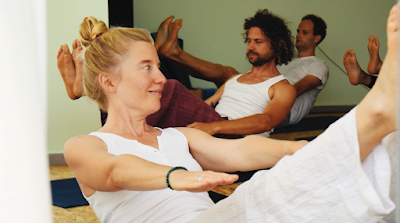With more people than ever experiencing stress and anxiety, many are turning to yoga for help.
With a
lineage over 5000 years old, yoga is a holistic method that aims at inner
balance. Although in today’s Western society, the main focus of yoga is on its
physical postures, it is through looking at the ancient yogic scriptures that
we can better understand the mechanisms of stress and how yoga can help.
Is Yoga only about postures?
The Sanskrit root of yoga is ‘yuk’ meaning to ‘yoke’, or unite. Essentially, yoga describes union. The union of the body, mind and soul. Through this union, the yogi can see their true self, and unite with the truth of the universe. Through this union, the mind is calm.
Rather than focusing solely on what happens on the yoga mat, the yogic wisdom invites us to explore how we interact with the world around us. As it is from this interaction that stress arises, observing how we do it is often the first step towards a balanced life.
If you are more of a rational mind,
you’ll be interested to hear that there is now a growing body of scientific
research to back these claims up. Through activating the body’s relaxation
response, yoga has been shown to help people lower their stress levels and
relieve many of the conditions caused by chronic stress. Here’s how yoga can
help you manage both the physical and mental aspects of stress.
Yoga can decrease the secretion of cortisol - the stress hormone
So, how does yoga reduce stress? Although many benefits of yoga can’t be measured, there is growing scientific evidence showing that yoga for stress and anxiety relief actually works.
Numerous studies have shown that regular practice can reduce the secretion of cortisol, the body’s stress hormone (1, 2).
Cortisol is one of the hormones which triggers our ‘fight or flight’, also
known as the stress response. By regulating the breath and allowing the body to
relax, yoga can reduce the secretion of this hormone and encourage the
production of oxytocin and endorphins - the ‘happy hormones’ - instead.
Yoga helps you slow down and be in the present moment
Even a 10-minute pranayama (breathing technique) practice invites you to slow down and cultivate stillness in both body and mind.
As stress often arises from worrying about the future - not getting there fast enough, or feeling overwhelmed by having too much to do - taking time out of the day to enjoy the present can be an invaluable tool.
Using the breath, yoga can allow you to discover being fully present in
stillness, and in doing so come back into a state of balance. Discovering how
to create a sense of calm within yourself is a lesson that you can take off the
yoga mat and into everyday life.
It can help to relieve other symptoms of stress
Although stress is most often associated with our mental and emotional health, it frequently manifests in the physical body. Many people suffering from stress often also experience painful side effects such as chronic back pain, insomnia, digestive or stomach problems, and high blood pressure.
Studies have shown that a yoga
practice which includes physical postures, breathwork and meditation can reduce
hypertension (3, 4),
improve sleep quality (5) and
ease low back pain (6).
Thanks to yoga’s nurturing of the mind-body connection, yoga helps to address
not only the feelings of stress but the body’s physiological response,
too.
It activates the parasympathetic nervous system
Any time we feel stressed or anxious, our bodies activate our sympathetic nervous system - also known as the ‘fight or flight’ response. Although this stress response is useful in some situations, we haven’t evolved to live constantly in a high-stress state. Unfortunately, this is what many people find themselves experiencing due to high-pressure jobs and busy lifestyles.
Yoga can help you manage stress by
activating the parasympathetic nervous system instead - the ‘rest and digest'
response. Through breathing exercises, postures and meditation, this
restorative nervous system allows the body to find deep relaxation and repair
damage induced by stress.
It helps you observe how you react to feelings of stress and discomfort - and how to overcome them
Hatha yoga, where postures are held
for longer, can help you to notice how you respond to feelings of stress. It
may sound simple, but holding your body in the same position for extended
periods of time can cause all sorts of feelings to arise, including stress. A
yoga practice can teach you to observe how you react when you feel
uncomfortable on the mat - and how you overcome those feelings. Discovering how
to nurture non-reactivity and remain calm under pressure can help you manage
stress in your daily life.
Who is speaking?
Emilie ROUVROY
Founder of Holon Yoga
Holon Yoga is a yoga studio open the whole year where we have weekly hatha yoga classes, gentle yoga for seniors and private yoga therapy sessions. We are currently located in Agii Pante (Apokoronas, Chania) and soon we will be moving to Vamos. To know more and join a class www.holon.gr/yoga or +3069800311 or info@holon.gr



Comments
Post a Comment